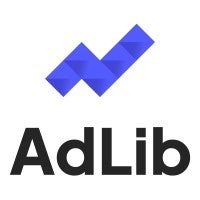A lot has changed since the mid 2010s. Smartphones, social media and streaming come to mind. And over in the ad tech world, there have been huge shifts, too, notably with the rise of AI infiltrating everything from campaign optimization to creative.
Mike Hauptman, co-founder of AdLib and former MediaMath exec, is confident that the role of AI will only continue to grow over the next few years.
Hauptman co-founded AdLib with Dan Bougourd nearly 10 years ago to make premium DSPs more accessible to marketers across the board. Both Hauptman and Bougourd were working at MediaMath at the time and built AdLib as an “easy-to-use version” for the mid-market, Hauptman told AdExchanger.
But the platform doesn’t look like it did a decade ago. AdLib is “fully embracing and exploring” new uses for AI, Hauptman said, but it’s not going to be a seamless transition for the industry. There will be “some conflicting incentives and some friction” before the industry is on a unified page, with a shared understanding of the best way to use these new tools.
AdExchanger: Tell me a little bit more about the history of AdLib and how it got on its feet.
MIKE HAUPTMAN: At MediaMath, we saw that enterprise marketers needed different workflows and tools to be successful. Dan was overseeing development of the core UI and core APIs, which were being built for enterprise customers, sort of like Salesforce. And that’s great, but those tools can be cumbersome. It’s like a Ferrari, where it has a lot of speed, but if you don’t really know what you’re doing, you spin out and hit a light pole.
We took a little bit of seed funding and incubated ourselves at MediaMath for a couple of years until we were able to focus on that full time and build out the business in that model until 2023, when MediaMath went dark.
Why is AdLib necessary right now? What problem is it solving?
The mid-market has some tools, but they usually leave a lot to be desired in terms of quality and capabilities.
AdLib has evolved to connect to over 20 different DSPs and platforms as a singular entry point to access all of programmatic. It eliminates the barriers and the complexities that you usually have by needing to have individual commercial agreements and interfaces with each license.
Plus, people are often specialized in one or two platforms, but they don’t know how to use all of them. So we’ve been preaching the need for redundancy, a layer where you’re controlling your workflow and controlling operations, and whatever happens on the DSP side doesn’t really matter.
MFAs have been a pretty contentious topic lately. What do you think is the best way to ensure that advertisers are getting the most out of ad placements, and do you think there are any upsides to these sites?
Low quality publishers that are just fake news sites are a problem and a stain on the industry. It’s a constant game of Whac-A-Mole that a lot of players are involved in providing the mallets for.
There are solutions to minimize the effect of MFA sites and to allow buyers to avoid them, but a lot of those involve taking on another partner, another vendor, another cost, another thing to manage.
But we believe we have a solid approach. We eliminate all of that complexity by having Jounce built in directly to AdLib, so we automatically exclude material that Jounce classifies as MFA across all campaigns on all platforms.
And we can’t talk about ad tech these days without talking about AI. How do you see it continuing to evolve and affect the industry?
There are already some pretty interesting and helpful applications to streamline operations and research.
Leaner companies might not have put in all of the work yet and historically would be thinking about building with people and firm processes. But now that playbook is out the window, and we’re going to see second- and third-mover advantage powered by AI.
Second and third movers don’t have to knock down, reorient themselves and then rebuild. They’re going to fly past some of the incumbents who are still trying to figure it out.
How do you see AI playing a role in the future of AdLib?
We’re at this inflection point where we are fully embracing and exploring what AI can do for us, to allow us to out-punch our weight on the product side and the people side.
We’ve already tapped into it for standard business, to eliminate some tedium and respond more quickly to clients. We use an email tool called fixer.ai, which allows us to respond to clients with a singular tone and tap into our knowledge base to ensure that we’re giving unified, consistent answers.
In the future, our products, our ability to optimize and the frequency at which we optimize will all be impacted by AI.
This interview has been lightly edited and condensed.
For more articles featuring Mike Hauptman, click here.


















